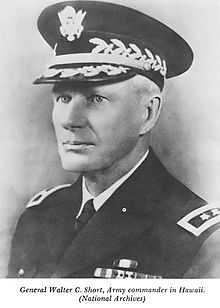Walter C. Short
Walter Campbell Short , (born March 30, 1880 in Fillmore , Illinois , † March 9, 1949 in Dallas , Texas ) was a lieutenant general in the United States Army and commander of the army forces in Hawaii during the attack on Pearl Harbor .
Life
Walter Short joined the US Army in 1902 at the age of 21. As a graduate of the University of Illinois , he received an officer's license as a lieutenant . He served in various garrisons as well as in the Philippines and took part in the Pancho Villa Expedition under General John J. Pershing in 1916 , an unsuccessful punitive expedition against Pancho Villa in Mexico . After the American entry into the First World War in 1917, he only held staff and training positions in France , he ended the war as Deputy Chief of the General Staff of the 3rd US Army , which occupied parts of the Rhineland .
Between 1920 and 1940 he held numerous staff and command posts, completed several courses at war academies and rose to the rank of brigadier general . During the U.S. Army's maneuvers in 1940, Short served as the commander of an army corps and was eventually promoted to major general, at the time the highest rank U.S. officers could achieve in peacetime.
In February 1941 Short was given command of the Hawaiian Army District (the Hawaiian Department ). His duties included the defense of the Hawaiian Islands against land and air attacks, including the port of Pearl Harbor , the main base of the American Pacific Fleet on Oahu . For his command he received the brevet rank of lieutenant general . The granting of these temporary ranks to the holders of high command posts was necessary because the existing US ranking system, which went up to the 2-star major general, was no longer sufficiently deep for the structure of the now greatly enlarged US armed forces.
As the commander of the army, Short seems to have seen his main task in training the troops stationed in Hawaii. In contrast to the commander of the Pacific Fleet, Admiral Husband E. Kimmel , who thought a Japanese air strike on Pearl Harbor at least possible as the opening strike of a war, he did not expect a serious attack on Hawaii. On November 27th, the Chief of Naval Operations , Admiral Harold R. Stark , sent a war alert to all commanders in the Pacific, warning of a possible war with Japan. Since the message also warned of possible Japanese acts of sabotage , but Hawaii was not on the list of probable Japanese targets that was also included, Short's actions were limited to a few measures to safeguard against sabotage. So he had all the army's planes moved from their standard parking positions on the edges of the airfields to the center, since they could be better guarded there. The anti-aircraft guns available to him mostly remained in the depots, the few batteries installed had no ammunition. When the Japanese actually began fighting the US with a surprise attack on Pearl Harbor on December 7, 1941, its forces were completely taken by surprise. The closely spaced machines in the middle of the airfields were perfect targets for the Japanese bombers, and by the time the army's anti-aircraft guns were in position, the attack was over.
Ten days after the attack, General Short was replaced by General Delos Carleton Emmons and received no new command. A commission of inquiry chaired by constitutional judge Owen Roberts declared in its report that he and Admiral Kimmel were primarily responsible for the defeat and accused them of negligence. Other investigative commissions that investigated the attack up to 1946 dropped this accusation and made the American army leadership around Admiral Stark and Short's superior, the Army Chief of Staff, General George C. Marshall , jointly responsible for the successful surprise and the troops' lack of combat readiness they had not passed all of the information they had about the Japanese intentions to the section commanders in the Pacific. The accusation remained, however, that Short had not taken the warnings of war with Japan seriously enough and had taken unsuitable measures.
When he was replaced, he returned to the regular rank of major general, and Short retired in 1942 and worked from then on for Ford Motor Company . He fought to restore his reputation until his death in 1949, but is widely regarded as a scapegoat for the events of Pearl Harbor to this day .
On May 25, 1999, the US Senate passed a resolution with 52:47 votes that acquitted Walter Short and Admiral Kimmel of all allegations and posthumously elevated them to the 4-star rank that all other higher-ranking American officers of the Second World War received at the latest when they left the armed forces.
Web links
- Walter Short in the database of Find a Grave (English)
- Biography (English)
- US Senate resolution of May 25, 1999
| personal data | |
|---|---|
| SURNAME | Short, Walter C. |
| ALTERNATIVE NAMES | Short, Walter Campbell (full name) |
| BRIEF DESCRIPTION | American General and Army Forces Commander during the attack on Pearl Harbor |
| DATE OF BIRTH | March 30, 1880 |
| PLACE OF BIRTH | Fillmore , Illinois |
| DATE OF DEATH | March 9, 1949 |
| Place of death | Dallas , Texas |

